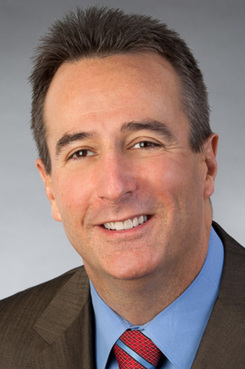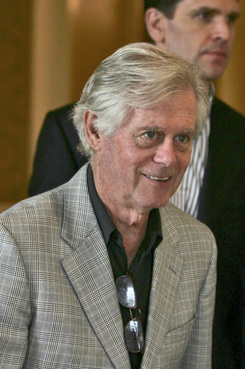This Big Law Firm's Next Leader Knows How to Hire
Dickinson Wright's newly elected CEO has helped recruit 250 lawyers and opened up a dozen new offices in recent years.
October 30, 2018 at 03:14 PM
5 minute read
 Michael Hammer
Michael Hammer
When Michael Hammer takes the reins as CEO of Dickinson Wright in January, one part of the job will be familiar territory: Recruiting lateral hires and opening new offices.
Hammer has served for the past decade as the Detroit-based Am Law 200 firm's deputy CEO, a role in which he oversaw the firm's expansion out of the Wolverine State by hiring some 250 lawyers and opening roughly a dozen offices. For nine of those years, Hammer served under the firm's outgoing CEO, William Burgess, who will complete his third three-year term at year's end.
In the past five years, Dickinson Wright has been one of the fastest-growing firms in the Am Law Second Hundred. It has more than doubled its gross revenue since fiscal 2010 and jumped 20 spots in the Am Law 200 list in the past two years alone, slotting in at No. 131 in 2017 with gross revenue of nearly $221 million. With 440 lawyers, Dickinson Wright had $522,000 in profits per equity partner, with revenue per lawyer coming in at $502,000 last year.
Dickinson Wright's most recent office opening came earlier this year when it launched in Silicon Valley with a six-lawyer intellectual property team brought over from California's Downey Brand. The firm also expanded a Toronto office in 2011 by bolting on 25-lawyer local firm Aylesworth and two years later Dickinson Wright absorbed 60-lawyer Arizona firm Mariscal, Weeks, McIntyre & Friedlander. In 2015, Dickinson Wright brought on large groups of lawyers from a pair of dissolving firms: Las Vegas-based Gordon & Silver and Washington, D.C.-based IP boutique Roylance, Abrams, Berdo & Goodman.
A bankruptcy partner who will give up his practice in order to dedicate himself full time to the role of CEO, Hammer said growing his firm's footprint and hiring lawyers will remain an important part of Dickinson Wright's strategy as the legal market grows more competitive.
“You just can't be a firm that is happy where it is at because there is no guarantee you can stay there for even a year,” Hammer told The American Lawyer on Tuesday. “You have to be aggressive and continue to add talent and practice depth and geographic capabilities to maintain and grow your market share. I come to this position with a full understanding of that and it will continue to be very important for us.”
Hammer said Dickinson Wright will also focus on investing in technology; increase its hiring and promotion of women and minority lawyers; and provide a flexible work environment to attract young talent.
On the technology front, Hammer said his firm had already invested in two data centers, obtained a specialized data security certification known as an ISO and updated its billing and matter management platform to the latest version of Thomson Reuters' Elite.
“We explain to partners that we are spending money investing in these data centers and in these new platforms, but you are going to need those to compete,” Hammer said.
In June, Dickinson Wright received the results of a study it commissioned from the University of Michigan into its hiring and promotion of women and diverse lawyers. The study showed that Dickinson Wright lagged behind national averages with regards to its hiring of women and minority lawyers, as well as the number of women and minorities that make up its partnership.
One bright spot in the study was that it showed that women and men were paid equally at the firm, Hammer said. He noted that the study was meant to provide the firm with an understanding of where it was as Dickinson Wright embarked on efforts to increase the number of women and minority lawyers in its ranks and bolster their satisfaction and ability to move up internally.
 John Ziegler Jr. walks to an NHL board of directors meeting in Palm Beach, Florida, on Dec. 4, 2006. (J. Pat Carter/AP Photo)
John Ziegler Jr. walks to an NHL board of directors meeting in Palm Beach, Florida, on Dec. 4, 2006. (J. Pat Carter/AP Photo)Hammer said it was still too early to report results on the firm's efforts, which have included training on implicit bias and also the creation of affinity groups.
As Dickinson Wright prepares for new leadership—The American Lawyer honored the firm's chairman emeritus Dennis Archer with a Lifetime Achievement award a decade ago—it is also mourning the loss of a former partner, John Ziegler Jr., who served as president of the National Hockey League from 1977 to 1992.
Ziegler, who presided over a period of rapid growth for the NHL, was elected into the Hockey Hall of Fame in 1987. He had retired to Florida, where he died on Oct. 25. He was 84.
This content has been archived. It is available through our partners, LexisNexis® and Bloomberg Law.
To view this content, please continue to their sites.
Not a Lexis Subscriber?
Subscribe Now
Not a Bloomberg Law Subscriber?
Subscribe Now
NOT FOR REPRINT
© 2025 ALM Global, LLC, All Rights Reserved. Request academic re-use from www.copyright.com. All other uses, submit a request to [email protected]. For more information visit Asset & Logo Licensing.
You Might Like
View All
Paul Hastings, Recruiting From Davis Polk, Adds Capital Markets Attorney
3 minute read

Three Akin Sports Lawyers Jump to Employment Firm Littler Mendelson

Brownstein Adds Former Interior Secretary, Offering 'Strategic Counsel' During New Trump Term
2 minute readTrending Stories
- 1Decision of the Day: Judge Dismisses Defamation Suit by New York Philharmonic Oboist Accused of Sexual Misconduct
- 2California Court Denies Apple's Motion to Strike Allegations in Gender Bias Class Action
- 3US DOJ Threatens to Prosecute Local Officials Who Don't Aid Immigration Enforcement
- 4Kirkland Is Entering a New Market. Will Its Rates Get a Warm Welcome?
- 5African Law Firm Investigated Over ‘AI-Generated’ Case References
Who Got The Work
J. Brugh Lower of Gibbons has entered an appearance for industrial equipment supplier Devco Corporation in a pending trademark infringement lawsuit. The suit, accusing the defendant of selling knock-off Graco products, was filed Dec. 18 in New Jersey District Court by Rivkin Radler on behalf of Graco Inc. and Graco Minnesota. The case, assigned to U.S. District Judge Zahid N. Quraishi, is 3:24-cv-11294, Graco Inc. et al v. Devco Corporation.
Who Got The Work
Rebecca Maller-Stein and Kent A. Yalowitz of Arnold & Porter Kaye Scholer have entered their appearances for Hanaco Venture Capital and its executives, Lior Prosor and David Frankel, in a pending securities lawsuit. The action, filed on Dec. 24 in New York Southern District Court by Zell, Aron & Co. on behalf of Goldeneye Advisors, accuses the defendants of negligently and fraudulently managing the plaintiff's $1 million investment. The case, assigned to U.S. District Judge Vernon S. Broderick, is 1:24-cv-09918, Goldeneye Advisors, LLC v. Hanaco Venture Capital, Ltd. et al.
Who Got The Work
Attorneys from A&O Shearman has stepped in as defense counsel for Toronto-Dominion Bank and other defendants in a pending securities class action. The suit, filed Dec. 11 in New York Southern District Court by Bleichmar Fonti & Auld, accuses the defendants of concealing the bank's 'pervasive' deficiencies in regards to its compliance with the Bank Secrecy Act and the quality of its anti-money laundering controls. The case, assigned to U.S. District Judge Arun Subramanian, is 1:24-cv-09445, Gonzalez v. The Toronto-Dominion Bank et al.
Who Got The Work
Crown Castle International, a Pennsylvania company providing shared communications infrastructure, has turned to Luke D. Wolf of Gordon Rees Scully Mansukhani to fend off a pending breach-of-contract lawsuit. The court action, filed Nov. 25 in Michigan Eastern District Court by Hooper Hathaway PC on behalf of The Town Residences LLC, accuses Crown Castle of failing to transfer approximately $30,000 in utility payments from T-Mobile in breach of a roof-top lease and assignment agreement. The case, assigned to U.S. District Judge Susan K. Declercq, is 2:24-cv-13131, The Town Residences LLC v. T-Mobile US, Inc. et al.
Who Got The Work
Wilfred P. Coronato and Daniel M. Schwartz of McCarter & English have stepped in as defense counsel to Electrolux Home Products Inc. in a pending product liability lawsuit. The court action, filed Nov. 26 in New York Eastern District Court by Poulos Lopiccolo PC and Nagel Rice LLP on behalf of David Stern, alleges that the defendant's refrigerators’ drawers and shelving repeatedly break and fall apart within months after purchase. The case, assigned to U.S. District Judge Joan M. Azrack, is 2:24-cv-08204, Stern v. Electrolux Home Products, Inc.
Featured Firms
Law Offices of Gary Martin Hays & Associates, P.C.
(470) 294-1674
Law Offices of Mark E. Salomone
(857) 444-6468
Smith & Hassler
(713) 739-1250









